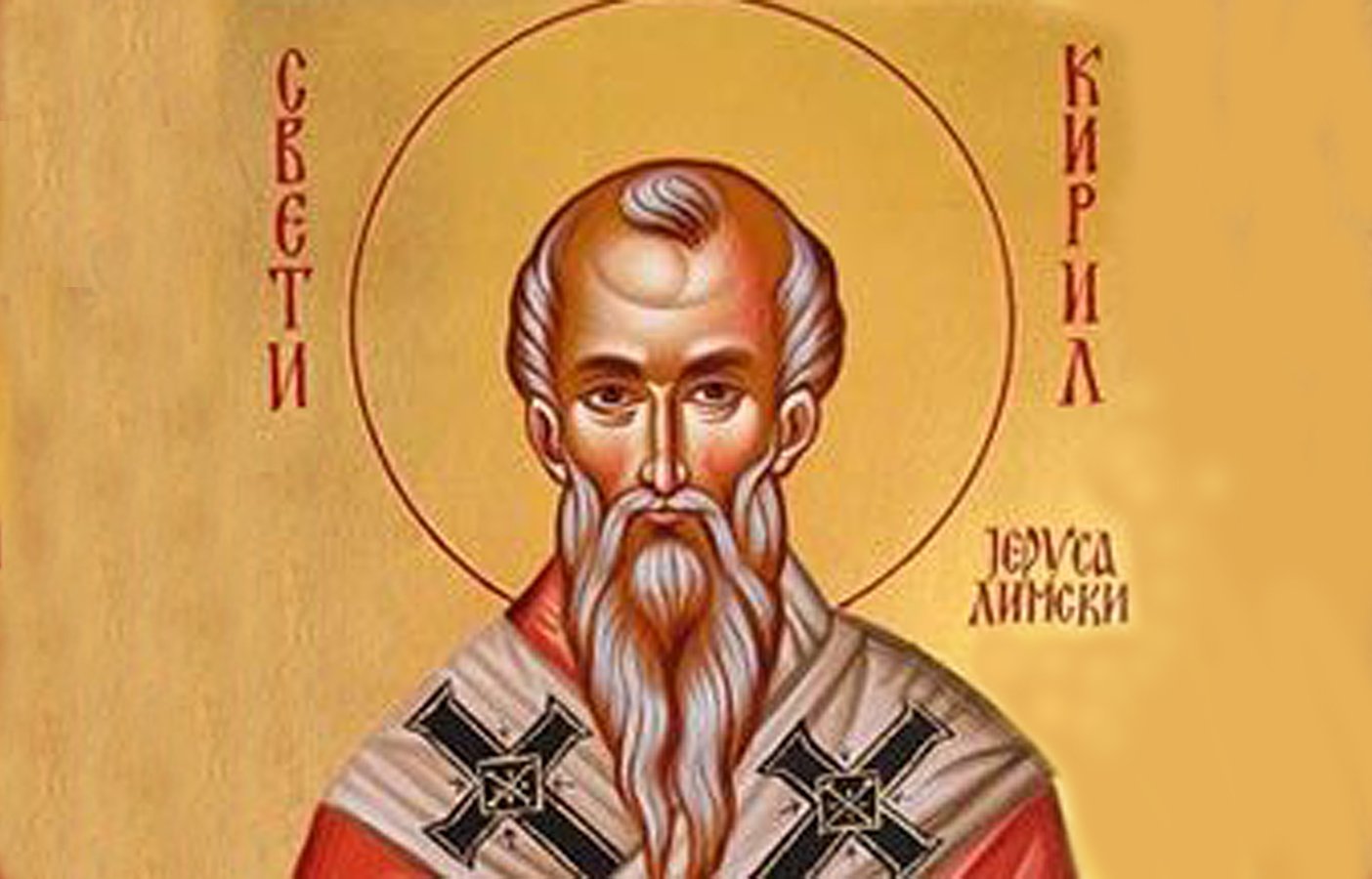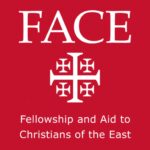St Cyril of Jerusalem

St Cyril of Jerusalem
Feast in the Roman & Byzantine calendar: 18 March
Reading
Mark 9:38–41
John said to Jesus, “Teacher, we saw someone casting out demons in your name, and we tried to stop him, because he was not following us.” But Jesus said, “Do not stop him; for no one who does a deed of power in my name will be able soon afterward to speak evil of me. Whoever is not against us is for us. For truly I tell you, whoever gives you a cup of water to drink because you bear the name of Christ will by no means lose the reward.”
From Cyril’s Catechetical Lecture Number 23: On the Mysteries V 21,22.
In approaching therefore, come not with your wrists extended, or your fingers spread; but make your left hand a throne for the right, as for that which is to receive a King. And having hollowed your palm, receive the Body of Christ, saying over it, Amen. So then after having carefully hallowed your eyes by the touch of the Holy Body, partake of it; giving heed lest you lose any portion thereof; for whatever you lose, is evidently a loss to you as it were from one of your own members. For tell me, if any one gave you grains of gold, would you not hold them with all carefulness, being on your guard against losing any of them, and suffering loss? Will you not then much more carefully keep watch, that not a crumb fall from you of what is more precious than gold and precious stones? Then, after you have partaken of the Body of Christ, draw near also to the Cup of His Blood; not stretching forth your hands, but bending , and saying with an air of worship and reverence, Amen, hallow yourself by partaking also of the Blood of Christ. And while the moisture is still upon your lips, touch it with your hands, and hallow your eyes and brow and the other organs of sense. Then wait for the prayer, and give thanks unto God, who has accounted you worthy of so great mysteries.
Reflection
Saint Cyril of Jerusalem
Reflection by Father Robin Gibbons, Greek Catholic Melkite priest; and Advisor and Chaplain to FACE.
One of the great gifts that Cyril gives us is a sense of firm foundation on Christ and the community of the Apostolic Church, because through him we get glimpses of the life of the 4th century Christian community at its source in Jerusalem. Here we see Cyril as an active and prayerful bishop and teacher of his flock, at a time when Christianity was on the point of becoming a new force, a legalised state religion. Nevertheless, we get from Cyril a series of illuminating and energising catechetical lectures on the development of a Christian’s faith; in particular the wonderful gift of the Sacraments of Initiation, which is the beginning of our family journey into the fullness of the Kingdom.
Cyril is a direct link between ourselves and the early Christian community in the land of Jesus, whose legacy is to be found in contemporary Eastern Christians living in those biblical lands. Despite their diminishing number, they somehow keep alive the living tradition of those places associated with Christ, with a spirit-filled and energised faith that shows itself in the sometimes disharmonious cacophony of the Jerusalem Church today.
We owe Cyril a great debt for bringing before us our vocation to help people become Christians, through teaching, guiding and praying with them, and also to develop our own faith further. In one of his homilies we discover Cyril speaking to those catechumens preparing for Baptism:
“Great is the Baptism that lies before you: a ransom to captives; a remission of offences; a death of sin; a new-birth of the soul; a garment of light; a holy indissoluble seal; a chariot to heaven; the delight of Paradise; a welcome into the kingdom; the gift of adoption!”
In that small collection of phrases, key theological, foundational Christian concepts emerge, which are essential for our own spiritual understanding. These are the nature of Baptism itself and the remission of our sins, as well as hope in the new life of the Kingdom as the adopted children of the light that is our God. If we ever talk about mission and ministry we could do no better that use Cyril as our guide and help; there is an energy in his words that comes from the Divine Light of Christ.
But Cyril is also full of the role of the Holy Spirit. In this he is totally at one with the gifted theology of the Eastern Church, particularly the Byzantine tradition. Speaking about the second stage of the Sacraments of Initiation, Chrismation, which we call Confirmation in the West, he speaks to us in these words:
“And to you in like manner, after you had come up from the pool of the sacred streams, there was given an Unction, the anti-type of that wherewith Christ was anointed; and this is the Holy Ghost; of whom also the blessed Esaias, in his prophecy respecting Him, said in the person of the Lord, The Spirit of the Lord is upon Me, because He hath anointed Me: He hath sent Me to preach glad tidings to the poor.”
If anything, this ‘Spirit-anointing’ needs reiterating in our church life today. Faced with the awful events in Ukraine, we have an opportunity to reach out and nourish those beleaguered and down-trodden people, yet also to support, understand and respect the Orthodox and Eastern Catholic traditions that they hold, especially since we will need great pastoral sensitivity towards many of them who come to us as refugees.
Cyril offers us more. Initiation is not simply Baptism and the Sealing of the Spirit in Chrismation. That is not an end sacrament, but an entry into a lifetime of growth and challenge with the Lord.
The reception of the Holy Mysteries, celebrating and receiving the Holy Eucharist is the final stage, but one without an end. From our first communion until viaticum, the Christ gives himself to us, that we may become ONE with Him and in Him. It is not for nothing that some of the Church Fathers tell us that we are the true icons of Christ, but it is also a very important reminder that the Holy Eucharist is primarily given to us to eat and drink, and in so doing we begin to see, in one another, the Christ whom we shall one day see in full glory!
Cyril speaks of this too:
“Wherefore with full assurance let us partake as of the Body and Blood of Christ: for in the figure of Bread is given to you His Body, and in the figure of Wine His Blood; that you by partaking of the Body and Blood of Christ, may be made of the same body and the same blood with Him. For thus we come to bear Christ in us, because His Body and Blood are distributed through our members; thus it is that, according to the blessed Peter, we become partakers of the divine nature”.
This is profound theology and truly liturgical spirituality which we really need to grasp; in other words, by reception of the Holy Eucharist, we become what is signified! I would comment, as an aside, that this theology from Cyril and the East is wanting in some of our churches today. I leave a final comment to the great saint as a gift to us at this time in life, and at this point on our Christian journey:
Hold fast these traditions undefiled and, keep yourselves free from offense. Sever not yourselves from the Communion; deprive not yourselves, through the pollution of sins, of these Holy and Spiritual Mysteries. And the God of peace sanctify you wholly; and may your spirit, and soul, and body be preserved entire without blame at the coming of our Lord jesus Christ.
(1 Thessalonians 5:23: To whom be glory and honour and might, with the Father and the Holy Spirit, now and ever, and world without end. Amen.)
Prayer
The Byzantine Litany before Communion
The people respond with Lord, have mercy, after each petition (R1)
Deacon: Having commemorated all the saints, again and again, in peace, let us pray to the Lord. R1
For the precious Gifts here presented and consecrated, let us pray to the Lord. R1
That our God Who loves mankind, having accepted them at His holy and celestial and mystical altar as an offering of spiritual fragrance, may in return send down upon us the divine grace and the gift of the Holy Spirit, let us pray. R1
For our deliverance from all affliction, wrath, danger, and necessity, let us pray to the Lord. R1
Help us, save us, have mercy on us, and protect us, O God, by Your grace. R1
That the whole day may be perfect, holy, peaceful, and sinless, let us ask the Lord.
The people respond with Grant this, O Lord, after each petition (R2)
For an angel of peace, a faithful guide, a guardian of our souls and bodies, let us ask the Lord. R2
For pardon and remission of our sins and transgressions, let us ask the Lord. R2
For that which is good and beneficial for our souls, and for peace for the world, let us ask the Lord. R2
That we may complete the remaining time of our life in peace and repentance, let us ask the Lord. R2
And let us ask for a Christian end to our life, peaceful, without shame and suffering, and for a good defense before the awesome judgment seat of Christ. R2
Deacon: Having asked for the unity of the faith and for the communion of the Holy Spirit, let us commend ourselves and one another and our whole life to Christ our God.
People: To You, O Lord.
Priest (in a low voice): We entrust to You, loving Master, our whole life and hope, and we beseech, pray, and implore You: Grant us to partake of Your heavenly and awesome Mysteries from this sacred and spiritual table with a clear conscience for the remission of sins, the forgiveness of transgressions, the communion of the Holy Spirit, the inheritance of the Kingdom of Heaven, and boldness before You, not unto judgment or condemnation.
From the Byzantine Chant sung after reception of Communion:
We have seen the true light.
We have received the heavenly Spirit.
We have found the true faith and we worship the undivided Trinity,
for the Trinity has saved us.
Biography
St Cyril of Jerusalem
Historians suggest Cyril was born about 315 and brought up in Jerusalem. He speaks about the appearance of the sites of the Nativity and Holy Sepulchre before they were “improved” as if he were a witness to them. All we know of his family were that his parents were probably Christians and he seemed to care for them a great deal. We know he also had a sister and a nephew, Gelasius, who became a bishop and a saint.
Cyril was consecrated as bishop of Jerusalem. Supported by the Arian bishop of Caesarea, Acacius, the orthodox criticized his appointment and the Arians thought they had a friend. Both factions were wrong, but Cyril wound up in the middle. He was eventually exiled for a time.
Cyril was allowed to go back to find Jerusalem destroyed by heresy and strife and he was never able to correct things completely. He attended the Council at Constantinople in 381, where the Nicene Creed and orthodoxy triumphed, and Arianism was finally condemned. Cyril received justice at the same Council who cleared him of all previous rumours and commended him for fighting “a good fight in various places against the Arians”.
Cyril had eight years of peace in Jerusalem before he died in 386, at about seventy years old.
